Psychology Report: Interview with an Older Adult - Analysis
VerifiedAdded on 2021/12/17
|24
|6714
|197
Report
AI Summary
This report presents an analysis of a series of interviews conducted with a 78-year-old African American woman, Mrs. X, focusing on her experiences of aging, loneliness, and the challenges she faces. The interviews, spanning three sessions, delve into Mrs. X's life, including her widowhood, family dynamics, and health issues. The report highlights key concepts such as loneliness, decline in life satisfaction, lack of knowledge about healthy aging, and racism experienced during healthcare access. It integrates these concepts with relevant research, including studies on the health consequences of loneliness, predictors of life satisfaction, and the importance of healthy aging practices. The report also explores the interviewer's personal feelings and reflections, providing a comprehensive understanding of the interviewee's experiences and the broader implications of aging and societal factors on the well-being of older adults. The analysis underscores the importance of addressing loneliness, promoting healthy aging practices, and combating racism in healthcare to improve the quality of life for older individuals.
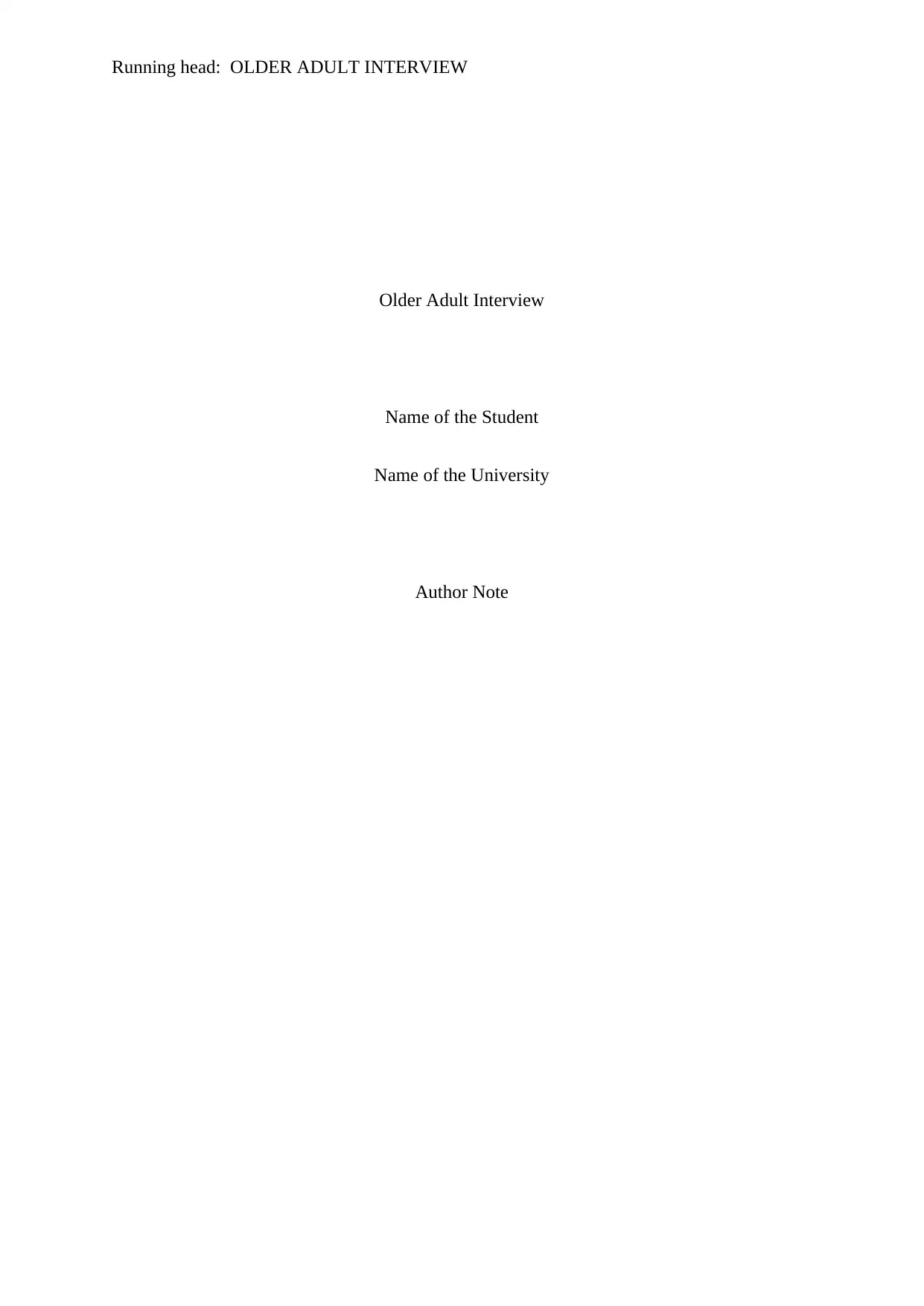
Running head: OLDER ADULT INTERVIEW
Older Adult Interview
Name of the Student
Name of the University
Author Note
Older Adult Interview
Name of the Student
Name of the University
Author Note
Paraphrase This Document
Need a fresh take? Get an instant paraphrase of this document with our AI Paraphraser
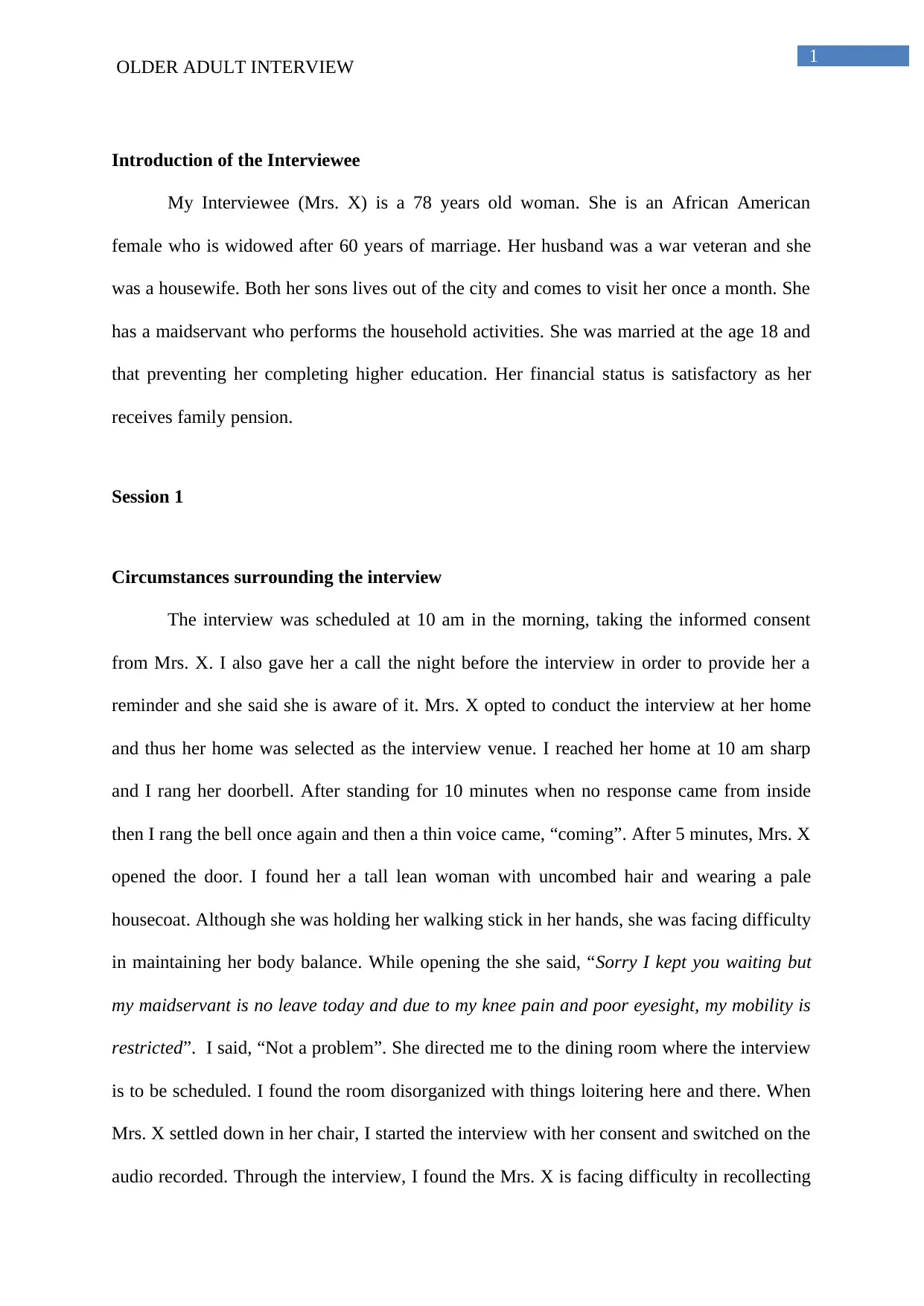
1
OLDER ADULT INTERVIEW
Introduction of the Interviewee
My Interviewee (Mrs. X) is a 78 years old woman. She is an African American
female who is widowed after 60 years of marriage. Her husband was a war veteran and she
was a housewife. Both her sons lives out of the city and comes to visit her once a month. She
has a maidservant who performs the household activities. She was married at the age 18 and
that preventing her completing higher education. Her financial status is satisfactory as her
receives family pension.
Session 1
Circumstances surrounding the interview
The interview was scheduled at 10 am in the morning, taking the informed consent
from Mrs. X. I also gave her a call the night before the interview in order to provide her a
reminder and she said she is aware of it. Mrs. X opted to conduct the interview at her home
and thus her home was selected as the interview venue. I reached her home at 10 am sharp
and I rang her doorbell. After standing for 10 minutes when no response came from inside
then I rang the bell once again and then a thin voice came, “coming”. After 5 minutes, Mrs. X
opened the door. I found her a tall lean woman with uncombed hair and wearing a pale
housecoat. Although she was holding her walking stick in her hands, she was facing difficulty
in maintaining her body balance. While opening the she said, “Sorry I kept you waiting but
my maidservant is no leave today and due to my knee pain and poor eyesight, my mobility is
restricted”. I said, “Not a problem”. She directed me to the dining room where the interview
is to be scheduled. I found the room disorganized with things loitering here and there. When
Mrs. X settled down in her chair, I started the interview with her consent and switched on the
audio recorded. Through the interview, I found the Mrs. X is facing difficulty in recollecting
OLDER ADULT INTERVIEW
Introduction of the Interviewee
My Interviewee (Mrs. X) is a 78 years old woman. She is an African American
female who is widowed after 60 years of marriage. Her husband was a war veteran and she
was a housewife. Both her sons lives out of the city and comes to visit her once a month. She
has a maidservant who performs the household activities. She was married at the age 18 and
that preventing her completing higher education. Her financial status is satisfactory as her
receives family pension.
Session 1
Circumstances surrounding the interview
The interview was scheduled at 10 am in the morning, taking the informed consent
from Mrs. X. I also gave her a call the night before the interview in order to provide her a
reminder and she said she is aware of it. Mrs. X opted to conduct the interview at her home
and thus her home was selected as the interview venue. I reached her home at 10 am sharp
and I rang her doorbell. After standing for 10 minutes when no response came from inside
then I rang the bell once again and then a thin voice came, “coming”. After 5 minutes, Mrs. X
opened the door. I found her a tall lean woman with uncombed hair and wearing a pale
housecoat. Although she was holding her walking stick in her hands, she was facing difficulty
in maintaining her body balance. While opening the she said, “Sorry I kept you waiting but
my maidservant is no leave today and due to my knee pain and poor eyesight, my mobility is
restricted”. I said, “Not a problem”. She directed me to the dining room where the interview
is to be scheduled. I found the room disorganized with things loitering here and there. When
Mrs. X settled down in her chair, I started the interview with her consent and switched on the
audio recorded. Through the interview, I found the Mrs. X is facing difficulty in recollecting
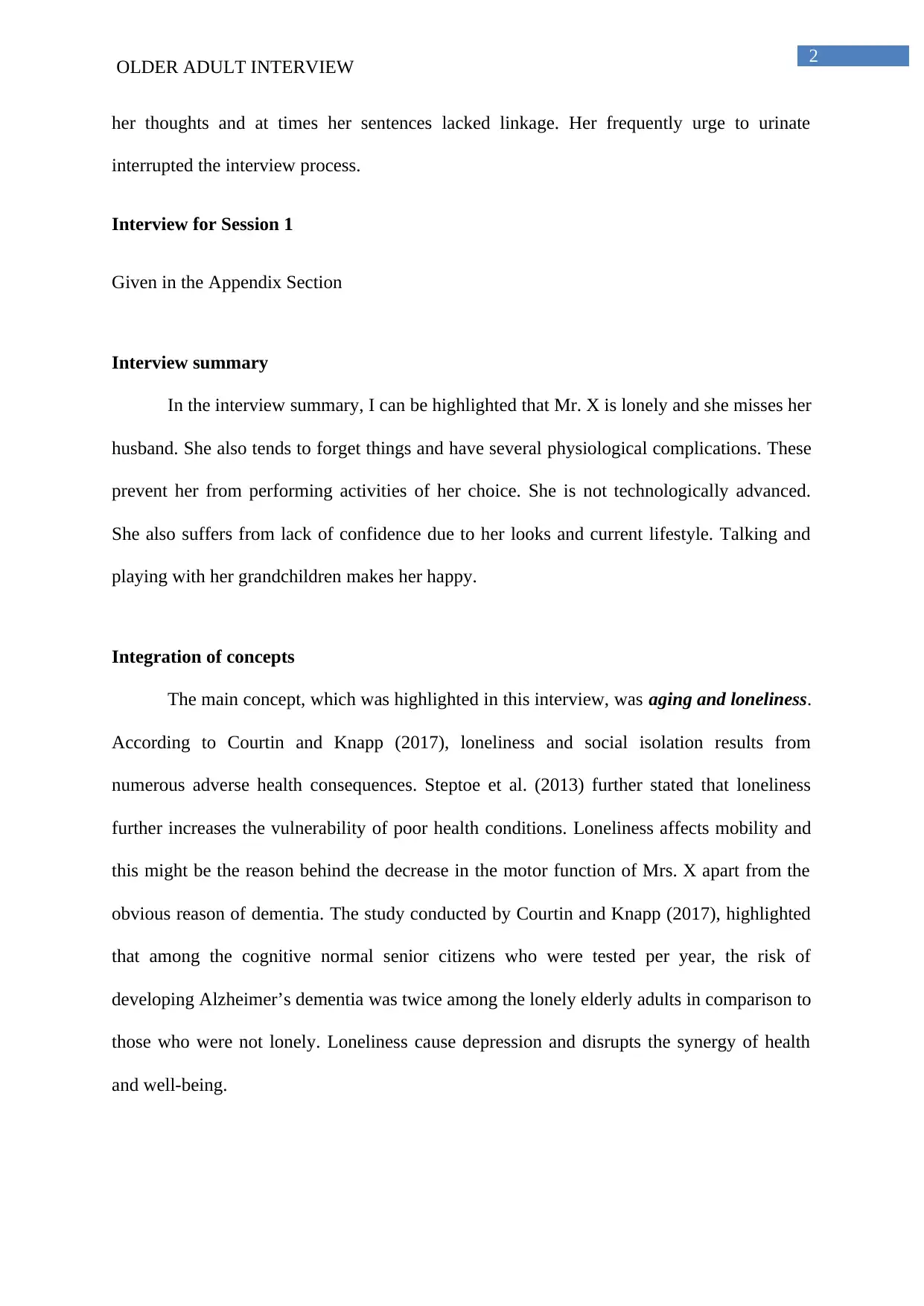
2
OLDER ADULT INTERVIEW
her thoughts and at times her sentences lacked linkage. Her frequently urge to urinate
interrupted the interview process.
Interview for Session 1
Given in the Appendix Section
Interview summary
In the interview summary, I can be highlighted that Mr. X is lonely and she misses her
husband. She also tends to forget things and have several physiological complications. These
prevent her from performing activities of her choice. She is not technologically advanced.
She also suffers from lack of confidence due to her looks and current lifestyle. Talking and
playing with her grandchildren makes her happy.
Integration of concepts
The main concept, which was highlighted in this interview, was aging and loneliness.
According to Courtin and Knapp (2017), loneliness and social isolation results from
numerous adverse health consequences. Steptoe et al. (2013) further stated that loneliness
further increases the vulnerability of poor health conditions. Loneliness affects mobility and
this might be the reason behind the decrease in the motor function of Mrs. X apart from the
obvious reason of dementia. The study conducted by Courtin and Knapp (2017), highlighted
that among the cognitive normal senior citizens who were tested per year, the risk of
developing Alzheimer’s dementia was twice among the lonely elderly adults in comparison to
those who were not lonely. Loneliness cause depression and disrupts the synergy of health
and well-being.
OLDER ADULT INTERVIEW
her thoughts and at times her sentences lacked linkage. Her frequently urge to urinate
interrupted the interview process.
Interview for Session 1
Given in the Appendix Section
Interview summary
In the interview summary, I can be highlighted that Mr. X is lonely and she misses her
husband. She also tends to forget things and have several physiological complications. These
prevent her from performing activities of her choice. She is not technologically advanced.
She also suffers from lack of confidence due to her looks and current lifestyle. Talking and
playing with her grandchildren makes her happy.
Integration of concepts
The main concept, which was highlighted in this interview, was aging and loneliness.
According to Courtin and Knapp (2017), loneliness and social isolation results from
numerous adverse health consequences. Steptoe et al. (2013) further stated that loneliness
further increases the vulnerability of poor health conditions. Loneliness affects mobility and
this might be the reason behind the decrease in the motor function of Mrs. X apart from the
obvious reason of dementia. The study conducted by Courtin and Knapp (2017), highlighted
that among the cognitive normal senior citizens who were tested per year, the risk of
developing Alzheimer’s dementia was twice among the lonely elderly adults in comparison to
those who were not lonely. Loneliness cause depression and disrupts the synergy of health
and well-being.
⊘ This is a preview!⊘
Do you want full access?
Subscribe today to unlock all pages.

Trusted by 1+ million students worldwide
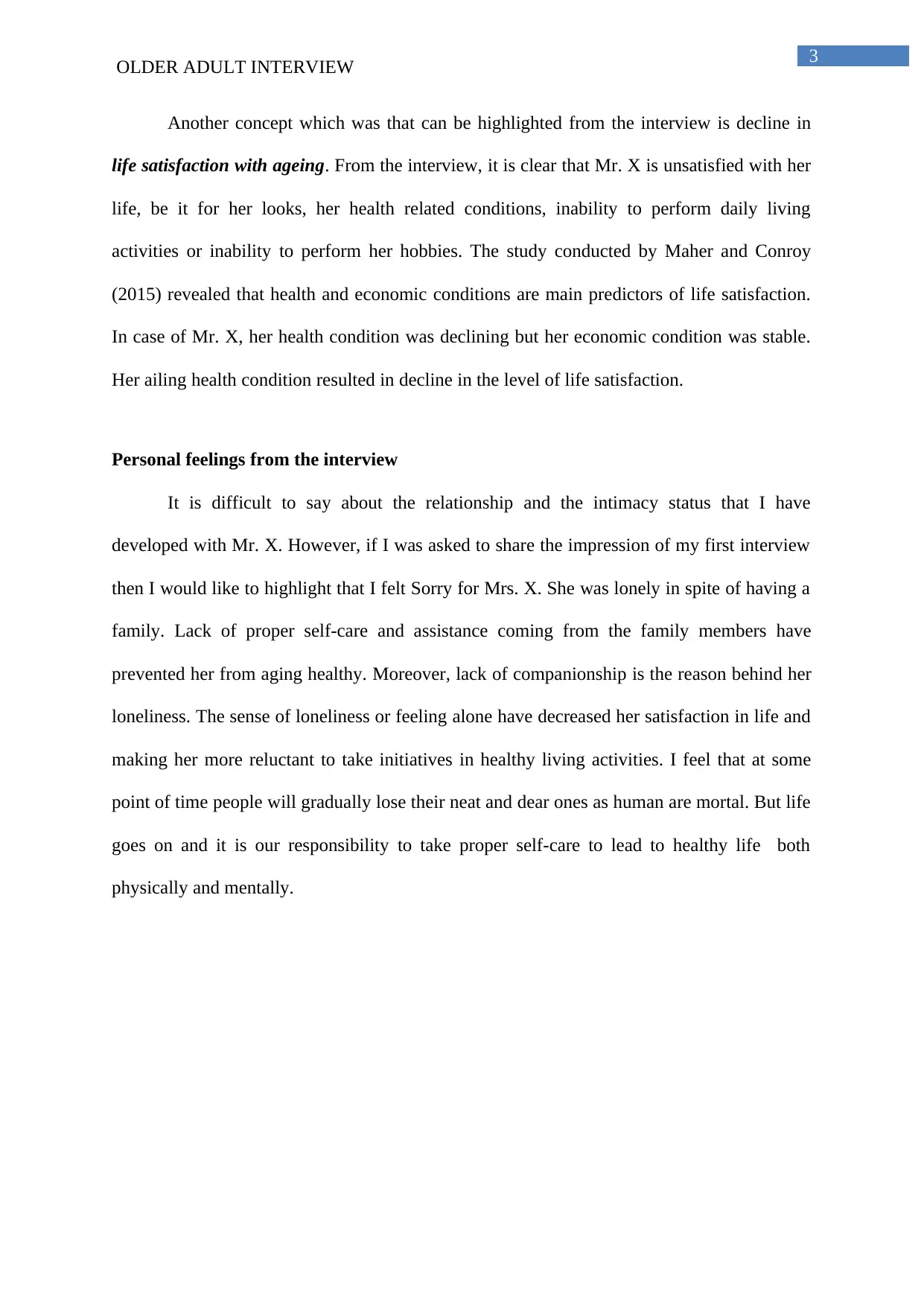
3
OLDER ADULT INTERVIEW
Another concept which was that can be highlighted from the interview is decline in
life satisfaction with ageing. From the interview, it is clear that Mr. X is unsatisfied with her
life, be it for her looks, her health related conditions, inability to perform daily living
activities or inability to perform her hobbies. The study conducted by Maher and Conroy
(2015) revealed that health and economic conditions are main predictors of life satisfaction.
In case of Mr. X, her health condition was declining but her economic condition was stable.
Her ailing health condition resulted in decline in the level of life satisfaction.
Personal feelings from the interview
It is difficult to say about the relationship and the intimacy status that I have
developed with Mr. X. However, if I was asked to share the impression of my first interview
then I would like to highlight that I felt Sorry for Mrs. X. She was lonely in spite of having a
family. Lack of proper self-care and assistance coming from the family members have
prevented her from aging healthy. Moreover, lack of companionship is the reason behind her
loneliness. The sense of loneliness or feeling alone have decreased her satisfaction in life and
making her more reluctant to take initiatives in healthy living activities. I feel that at some
point of time people will gradually lose their neat and dear ones as human are mortal. But life
goes on and it is our responsibility to take proper self-care to lead to healthy life both
physically and mentally.
OLDER ADULT INTERVIEW
Another concept which was that can be highlighted from the interview is decline in
life satisfaction with ageing. From the interview, it is clear that Mr. X is unsatisfied with her
life, be it for her looks, her health related conditions, inability to perform daily living
activities or inability to perform her hobbies. The study conducted by Maher and Conroy
(2015) revealed that health and economic conditions are main predictors of life satisfaction.
In case of Mr. X, her health condition was declining but her economic condition was stable.
Her ailing health condition resulted in decline in the level of life satisfaction.
Personal feelings from the interview
It is difficult to say about the relationship and the intimacy status that I have
developed with Mr. X. However, if I was asked to share the impression of my first interview
then I would like to highlight that I felt Sorry for Mrs. X. She was lonely in spite of having a
family. Lack of proper self-care and assistance coming from the family members have
prevented her from aging healthy. Moreover, lack of companionship is the reason behind her
loneliness. The sense of loneliness or feeling alone have decreased her satisfaction in life and
making her more reluctant to take initiatives in healthy living activities. I feel that at some
point of time people will gradually lose their neat and dear ones as human are mortal. But life
goes on and it is our responsibility to take proper self-care to lead to healthy life both
physically and mentally.
Paraphrase This Document
Need a fresh take? Get an instant paraphrase of this document with our AI Paraphraser
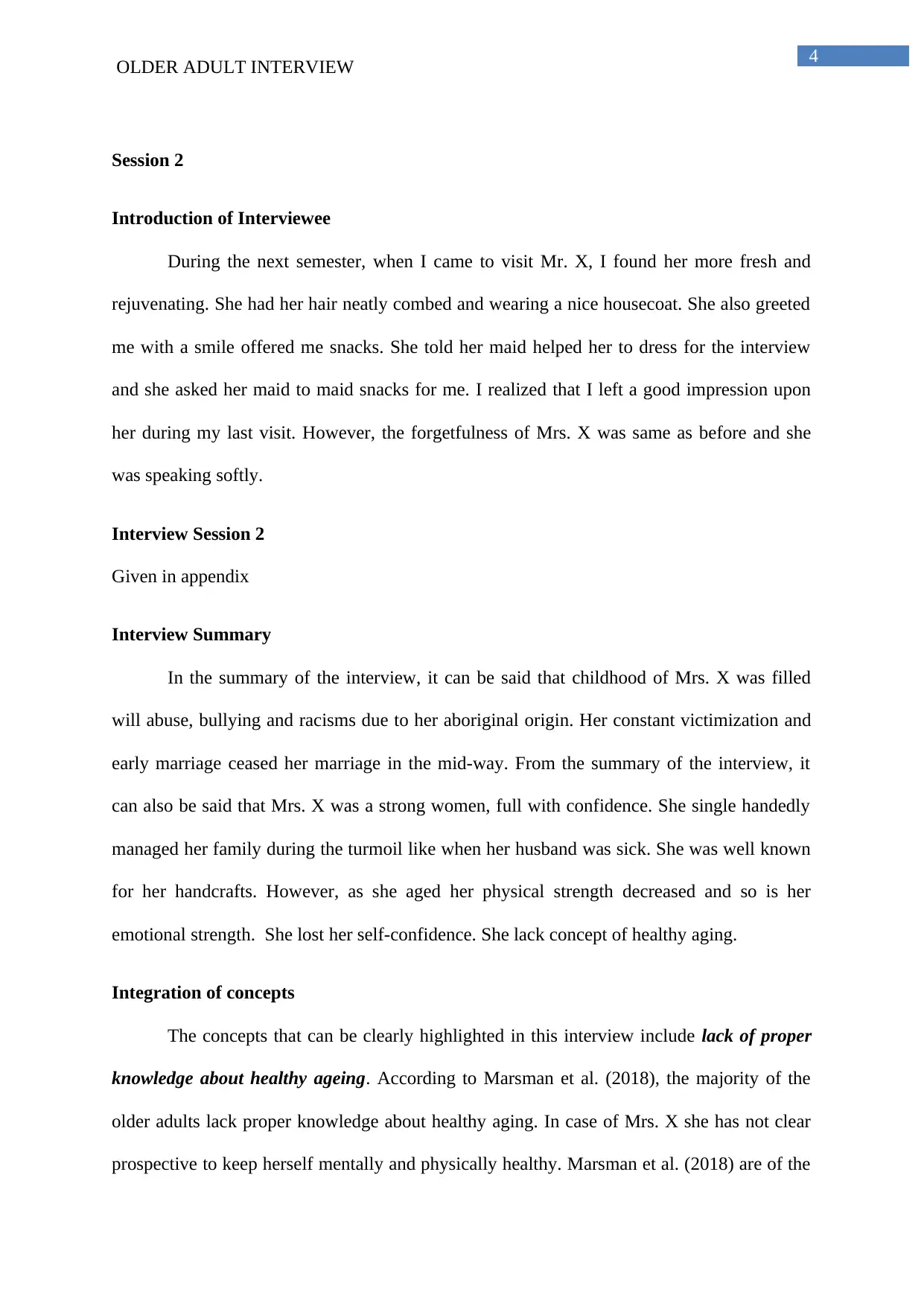
4
OLDER ADULT INTERVIEW
Session 2
Introduction of Interviewee
During the next semester, when I came to visit Mr. X, I found her more fresh and
rejuvenating. She had her hair neatly combed and wearing a nice housecoat. She also greeted
me with a smile offered me snacks. She told her maid helped her to dress for the interview
and she asked her maid to maid snacks for me. I realized that I left a good impression upon
her during my last visit. However, the forgetfulness of Mrs. X was same as before and she
was speaking softly.
Interview Session 2
Given in appendix
Interview Summary
In the summary of the interview, it can be said that childhood of Mrs. X was filled
will abuse, bullying and racisms due to her aboriginal origin. Her constant victimization and
early marriage ceased her marriage in the mid-way. From the summary of the interview, it
can also be said that Mrs. X was a strong women, full with confidence. She single handedly
managed her family during the turmoil like when her husband was sick. She was well known
for her handcrafts. However, as she aged her physical strength decreased and so is her
emotional strength. She lost her self-confidence. She lack concept of healthy aging.
Integration of concepts
The concepts that can be clearly highlighted in this interview include lack of proper
knowledge about healthy ageing. According to Marsman et al. (2018), the majority of the
older adults lack proper knowledge about healthy aging. In case of Mrs. X she has not clear
prospective to keep herself mentally and physically healthy. Marsman et al. (2018) are of the
OLDER ADULT INTERVIEW
Session 2
Introduction of Interviewee
During the next semester, when I came to visit Mr. X, I found her more fresh and
rejuvenating. She had her hair neatly combed and wearing a nice housecoat. She also greeted
me with a smile offered me snacks. She told her maid helped her to dress for the interview
and she asked her maid to maid snacks for me. I realized that I left a good impression upon
her during my last visit. However, the forgetfulness of Mrs. X was same as before and she
was speaking softly.
Interview Session 2
Given in appendix
Interview Summary
In the summary of the interview, it can be said that childhood of Mrs. X was filled
will abuse, bullying and racisms due to her aboriginal origin. Her constant victimization and
early marriage ceased her marriage in the mid-way. From the summary of the interview, it
can also be said that Mrs. X was a strong women, full with confidence. She single handedly
managed her family during the turmoil like when her husband was sick. She was well known
for her handcrafts. However, as she aged her physical strength decreased and so is her
emotional strength. She lost her self-confidence. She lack concept of healthy aging.
Integration of concepts
The concepts that can be clearly highlighted in this interview include lack of proper
knowledge about healthy ageing. According to Marsman et al. (2018), the majority of the
older adults lack proper knowledge about healthy aging. In case of Mrs. X she has not clear
prospective to keep herself mentally and physically healthy. Marsman et al. (2018) are of the
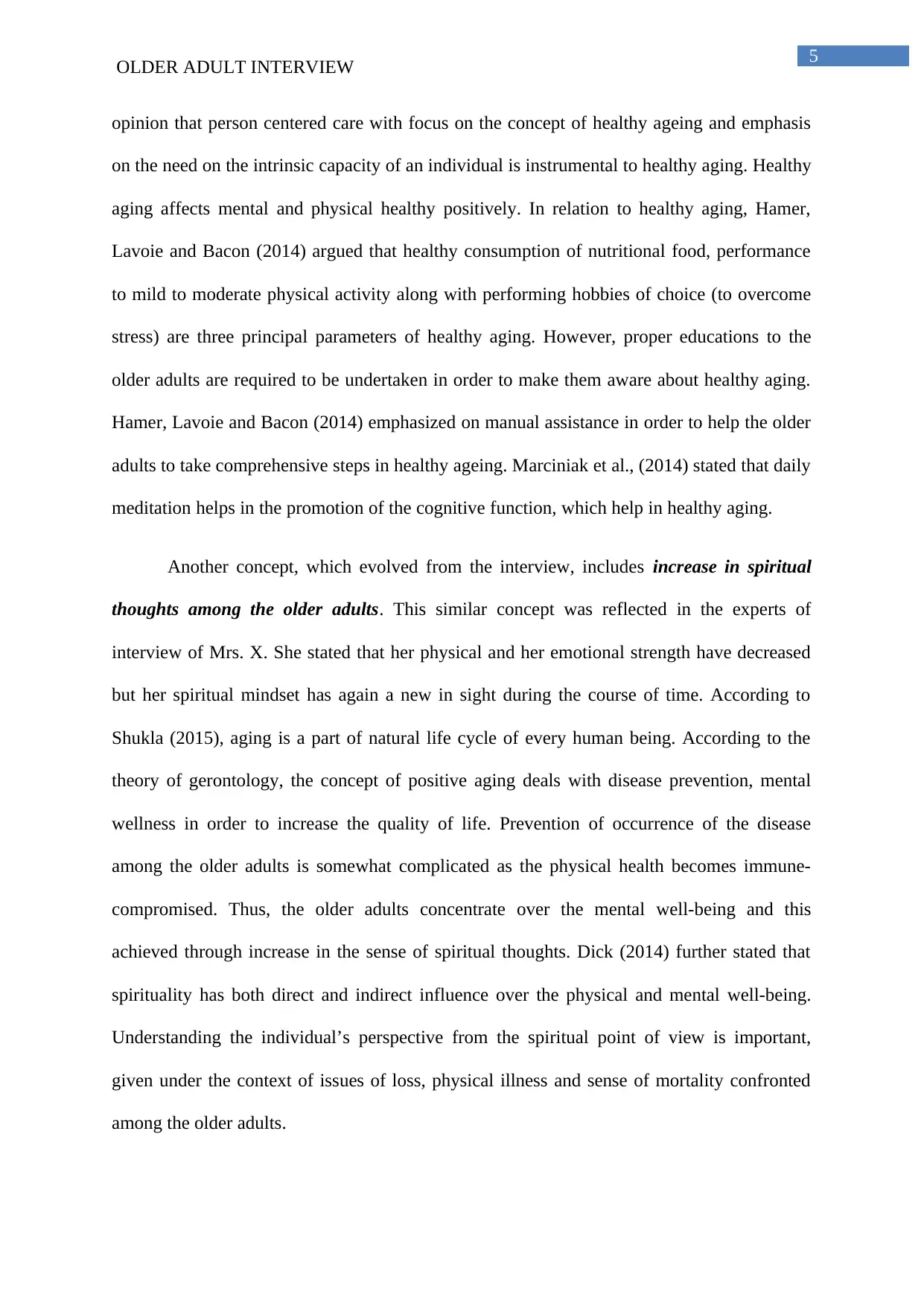
5
OLDER ADULT INTERVIEW
opinion that person centered care with focus on the concept of healthy ageing and emphasis
on the need on the intrinsic capacity of an individual is instrumental to healthy aging. Healthy
aging affects mental and physical healthy positively. In relation to healthy aging, Hamer,
Lavoie and Bacon (2014) argued that healthy consumption of nutritional food, performance
to mild to moderate physical activity along with performing hobbies of choice (to overcome
stress) are three principal parameters of healthy aging. However, proper educations to the
older adults are required to be undertaken in order to make them aware about healthy aging.
Hamer, Lavoie and Bacon (2014) emphasized on manual assistance in order to help the older
adults to take comprehensive steps in healthy ageing. Marciniak et al., (2014) stated that daily
meditation helps in the promotion of the cognitive function, which help in healthy aging.
Another concept, which evolved from the interview, includes increase in spiritual
thoughts among the older adults. This similar concept was reflected in the experts of
interview of Mrs. X. She stated that her physical and her emotional strength have decreased
but her spiritual mindset has again a new in sight during the course of time. According to
Shukla (2015), aging is a part of natural life cycle of every human being. According to the
theory of gerontology, the concept of positive aging deals with disease prevention, mental
wellness in order to increase the quality of life. Prevention of occurrence of the disease
among the older adults is somewhat complicated as the physical health becomes immune-
compromised. Thus, the older adults concentrate over the mental well-being and this
achieved through increase in the sense of spiritual thoughts. Dick (2014) further stated that
spirituality has both direct and indirect influence over the physical and mental well-being.
Understanding the individual’s perspective from the spiritual point of view is important,
given under the context of issues of loss, physical illness and sense of mortality confronted
among the older adults.
OLDER ADULT INTERVIEW
opinion that person centered care with focus on the concept of healthy ageing and emphasis
on the need on the intrinsic capacity of an individual is instrumental to healthy aging. Healthy
aging affects mental and physical healthy positively. In relation to healthy aging, Hamer,
Lavoie and Bacon (2014) argued that healthy consumption of nutritional food, performance
to mild to moderate physical activity along with performing hobbies of choice (to overcome
stress) are three principal parameters of healthy aging. However, proper educations to the
older adults are required to be undertaken in order to make them aware about healthy aging.
Hamer, Lavoie and Bacon (2014) emphasized on manual assistance in order to help the older
adults to take comprehensive steps in healthy ageing. Marciniak et al., (2014) stated that daily
meditation helps in the promotion of the cognitive function, which help in healthy aging.
Another concept, which evolved from the interview, includes increase in spiritual
thoughts among the older adults. This similar concept was reflected in the experts of
interview of Mrs. X. She stated that her physical and her emotional strength have decreased
but her spiritual mindset has again a new in sight during the course of time. According to
Shukla (2015), aging is a part of natural life cycle of every human being. According to the
theory of gerontology, the concept of positive aging deals with disease prevention, mental
wellness in order to increase the quality of life. Prevention of occurrence of the disease
among the older adults is somewhat complicated as the physical health becomes immune-
compromised. Thus, the older adults concentrate over the mental well-being and this
achieved through increase in the sense of spiritual thoughts. Dick (2014) further stated that
spirituality has both direct and indirect influence over the physical and mental well-being.
Understanding the individual’s perspective from the spiritual point of view is important,
given under the context of issues of loss, physical illness and sense of mortality confronted
among the older adults.
⊘ This is a preview!⊘
Do you want full access?
Subscribe today to unlock all pages.

Trusted by 1+ million students worldwide
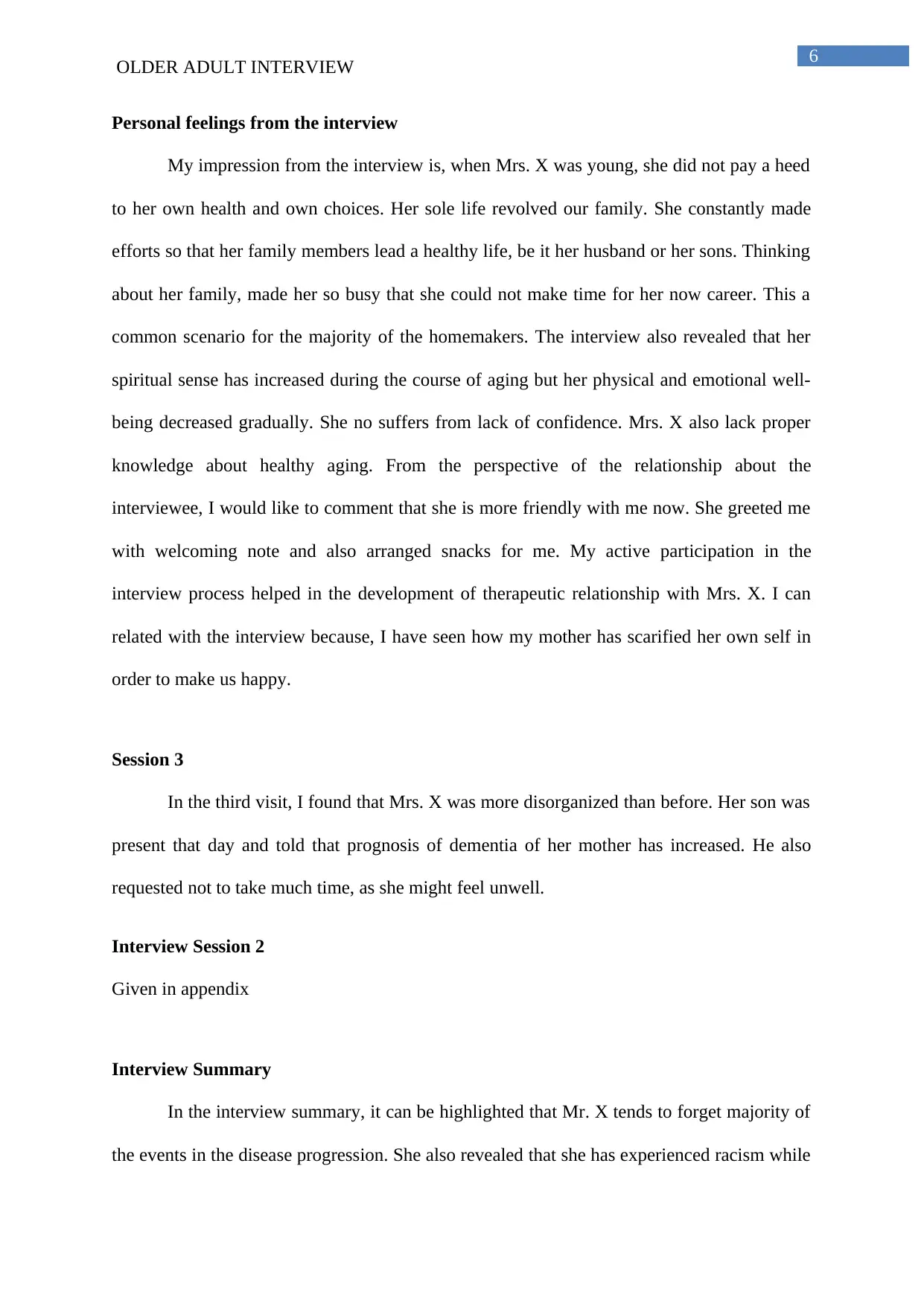
6
OLDER ADULT INTERVIEW
Personal feelings from the interview
My impression from the interview is, when Mrs. X was young, she did not pay a heed
to her own health and own choices. Her sole life revolved our family. She constantly made
efforts so that her family members lead a healthy life, be it her husband or her sons. Thinking
about her family, made her so busy that she could not make time for her now career. This a
common scenario for the majority of the homemakers. The interview also revealed that her
spiritual sense has increased during the course of aging but her physical and emotional well-
being decreased gradually. She no suffers from lack of confidence. Mrs. X also lack proper
knowledge about healthy aging. From the perspective of the relationship about the
interviewee, I would like to comment that she is more friendly with me now. She greeted me
with welcoming note and also arranged snacks for me. My active participation in the
interview process helped in the development of therapeutic relationship with Mrs. X. I can
related with the interview because, I have seen how my mother has scarified her own self in
order to make us happy.
Session 3
In the third visit, I found that Mrs. X was more disorganized than before. Her son was
present that day and told that prognosis of dementia of her mother has increased. He also
requested not to take much time, as she might feel unwell.
Interview Session 2
Given in appendix
Interview Summary
In the interview summary, it can be highlighted that Mr. X tends to forget majority of
the events in the disease progression. She also revealed that she has experienced racism while
OLDER ADULT INTERVIEW
Personal feelings from the interview
My impression from the interview is, when Mrs. X was young, she did not pay a heed
to her own health and own choices. Her sole life revolved our family. She constantly made
efforts so that her family members lead a healthy life, be it her husband or her sons. Thinking
about her family, made her so busy that she could not make time for her now career. This a
common scenario for the majority of the homemakers. The interview also revealed that her
spiritual sense has increased during the course of aging but her physical and emotional well-
being decreased gradually. She no suffers from lack of confidence. Mrs. X also lack proper
knowledge about healthy aging. From the perspective of the relationship about the
interviewee, I would like to comment that she is more friendly with me now. She greeted me
with welcoming note and also arranged snacks for me. My active participation in the
interview process helped in the development of therapeutic relationship with Mrs. X. I can
related with the interview because, I have seen how my mother has scarified her own self in
order to make us happy.
Session 3
In the third visit, I found that Mrs. X was more disorganized than before. Her son was
present that day and told that prognosis of dementia of her mother has increased. He also
requested not to take much time, as she might feel unwell.
Interview Session 2
Given in appendix
Interview Summary
In the interview summary, it can be highlighted that Mr. X tends to forget majority of
the events in the disease progression. She also revealed that she has experienced racism while
Paraphrase This Document
Need a fresh take? Get an instant paraphrase of this document with our AI Paraphraser
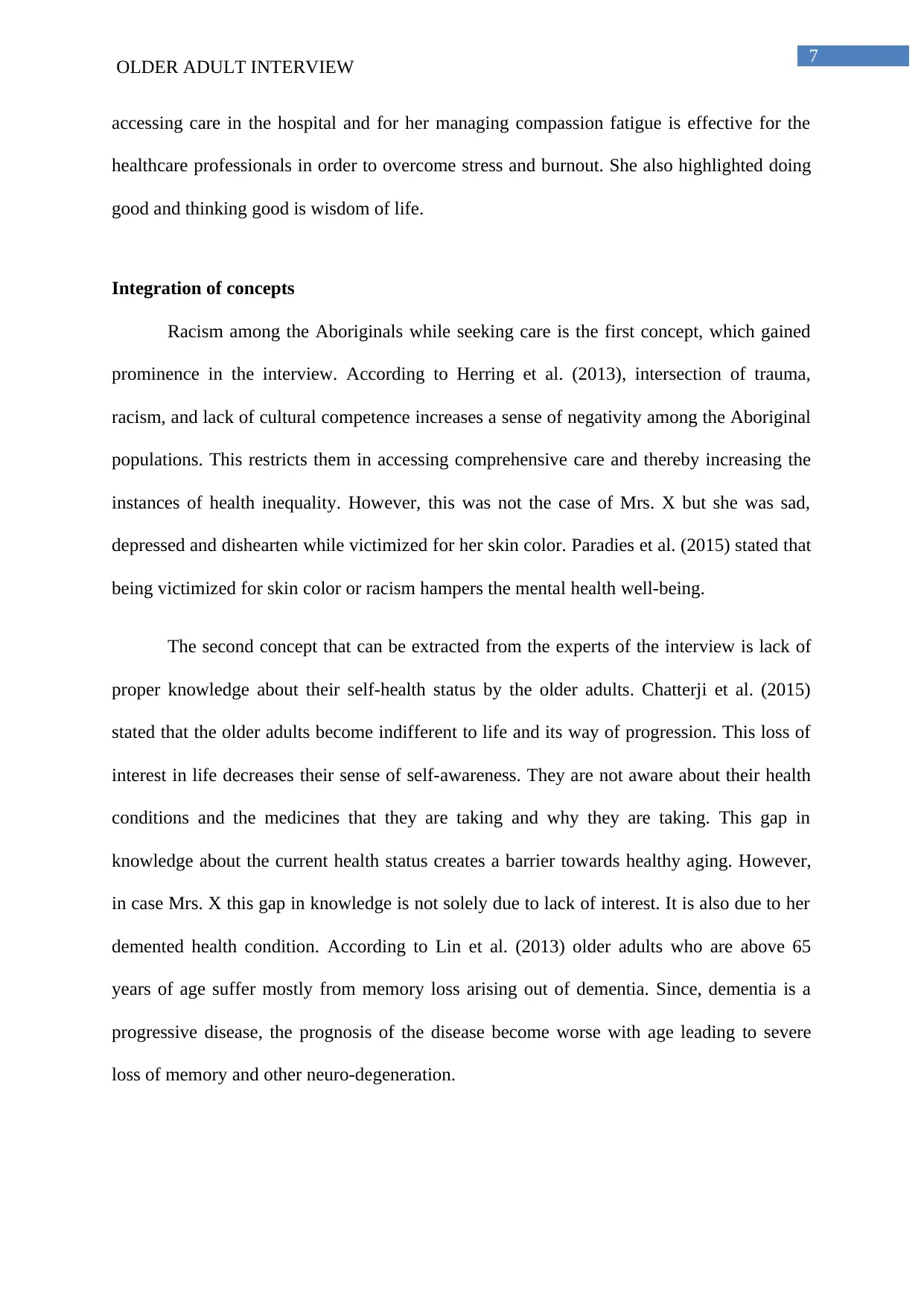
7
OLDER ADULT INTERVIEW
accessing care in the hospital and for her managing compassion fatigue is effective for the
healthcare professionals in order to overcome stress and burnout. She also highlighted doing
good and thinking good is wisdom of life.
Integration of concepts
Racism among the Aboriginals while seeking care is the first concept, which gained
prominence in the interview. According to Herring et al. (2013), intersection of trauma,
racism, and lack of cultural competence increases a sense of negativity among the Aboriginal
populations. This restricts them in accessing comprehensive care and thereby increasing the
instances of health inequality. However, this was not the case of Mrs. X but she was sad,
depressed and dishearten while victimized for her skin color. Paradies et al. (2015) stated that
being victimized for skin color or racism hampers the mental health well-being.
The second concept that can be extracted from the experts of the interview is lack of
proper knowledge about their self-health status by the older adults. Chatterji et al. (2015)
stated that the older adults become indifferent to life and its way of progression. This loss of
interest in life decreases their sense of self-awareness. They are not aware about their health
conditions and the medicines that they are taking and why they are taking. This gap in
knowledge about the current health status creates a barrier towards healthy aging. However,
in case Mrs. X this gap in knowledge is not solely due to lack of interest. It is also due to her
demented health condition. According to Lin et al. (2013) older adults who are above 65
years of age suffer mostly from memory loss arising out of dementia. Since, dementia is a
progressive disease, the prognosis of the disease become worse with age leading to severe
loss of memory and other neuro-degeneration.
OLDER ADULT INTERVIEW
accessing care in the hospital and for her managing compassion fatigue is effective for the
healthcare professionals in order to overcome stress and burnout. She also highlighted doing
good and thinking good is wisdom of life.
Integration of concepts
Racism among the Aboriginals while seeking care is the first concept, which gained
prominence in the interview. According to Herring et al. (2013), intersection of trauma,
racism, and lack of cultural competence increases a sense of negativity among the Aboriginal
populations. This restricts them in accessing comprehensive care and thereby increasing the
instances of health inequality. However, this was not the case of Mrs. X but she was sad,
depressed and dishearten while victimized for her skin color. Paradies et al. (2015) stated that
being victimized for skin color or racism hampers the mental health well-being.
The second concept that can be extracted from the experts of the interview is lack of
proper knowledge about their self-health status by the older adults. Chatterji et al. (2015)
stated that the older adults become indifferent to life and its way of progression. This loss of
interest in life decreases their sense of self-awareness. They are not aware about their health
conditions and the medicines that they are taking and why they are taking. This gap in
knowledge about the current health status creates a barrier towards healthy aging. However,
in case Mrs. X this gap in knowledge is not solely due to lack of interest. It is also due to her
demented health condition. According to Lin et al. (2013) older adults who are above 65
years of age suffer mostly from memory loss arising out of dementia. Since, dementia is a
progressive disease, the prognosis of the disease become worse with age leading to severe
loss of memory and other neuro-degeneration.
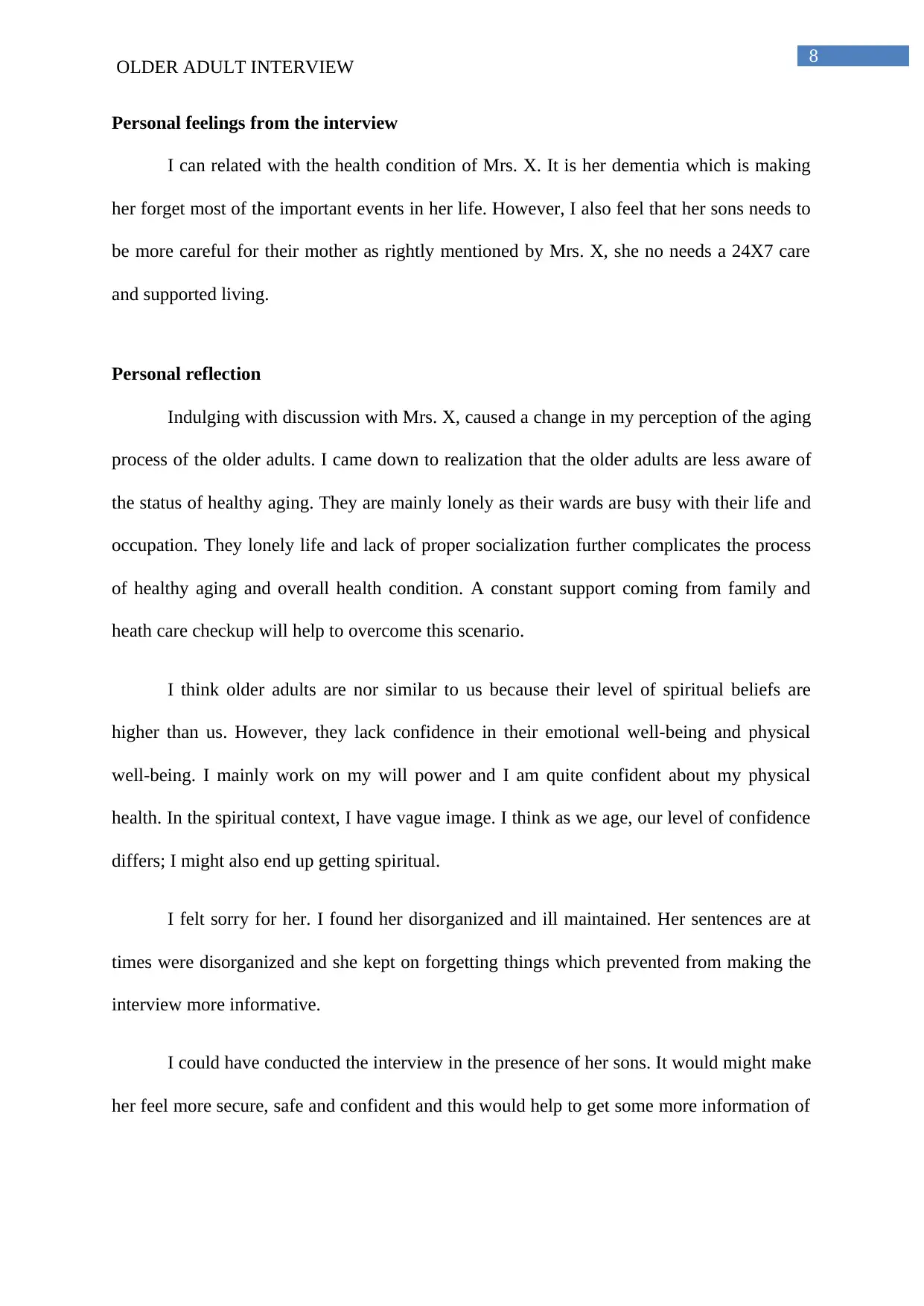
8
OLDER ADULT INTERVIEW
Personal feelings from the interview
I can related with the health condition of Mrs. X. It is her dementia which is making
her forget most of the important events in her life. However, I also feel that her sons needs to
be more careful for their mother as rightly mentioned by Mrs. X, she no needs a 24X7 care
and supported living.
Personal reflection
Indulging with discussion with Mrs. X, caused a change in my perception of the aging
process of the older adults. I came down to realization that the older adults are less aware of
the status of healthy aging. They are mainly lonely as their wards are busy with their life and
occupation. They lonely life and lack of proper socialization further complicates the process
of healthy aging and overall health condition. A constant support coming from family and
heath care checkup will help to overcome this scenario.
I think older adults are nor similar to us because their level of spiritual beliefs are
higher than us. However, they lack confidence in their emotional well-being and physical
well-being. I mainly work on my will power and I am quite confident about my physical
health. In the spiritual context, I have vague image. I think as we age, our level of confidence
differs; I might also end up getting spiritual.
I felt sorry for her. I found her disorganized and ill maintained. Her sentences are at
times were disorganized and she kept on forgetting things which prevented from making the
interview more informative.
I could have conducted the interview in the presence of her sons. It would might make
her feel more secure, safe and confident and this would help to get some more information of
OLDER ADULT INTERVIEW
Personal feelings from the interview
I can related with the health condition of Mrs. X. It is her dementia which is making
her forget most of the important events in her life. However, I also feel that her sons needs to
be more careful for their mother as rightly mentioned by Mrs. X, she no needs a 24X7 care
and supported living.
Personal reflection
Indulging with discussion with Mrs. X, caused a change in my perception of the aging
process of the older adults. I came down to realization that the older adults are less aware of
the status of healthy aging. They are mainly lonely as their wards are busy with their life and
occupation. They lonely life and lack of proper socialization further complicates the process
of healthy aging and overall health condition. A constant support coming from family and
heath care checkup will help to overcome this scenario.
I think older adults are nor similar to us because their level of spiritual beliefs are
higher than us. However, they lack confidence in their emotional well-being and physical
well-being. I mainly work on my will power and I am quite confident about my physical
health. In the spiritual context, I have vague image. I think as we age, our level of confidence
differs; I might also end up getting spiritual.
I felt sorry for her. I found her disorganized and ill maintained. Her sentences are at
times were disorganized and she kept on forgetting things which prevented from making the
interview more informative.
I could have conducted the interview in the presence of her sons. It would might make
her feel more secure, safe and confident and this would help to get some more information of
⊘ This is a preview!⊘
Do you want full access?
Subscribe today to unlock all pages.

Trusted by 1+ million students worldwide
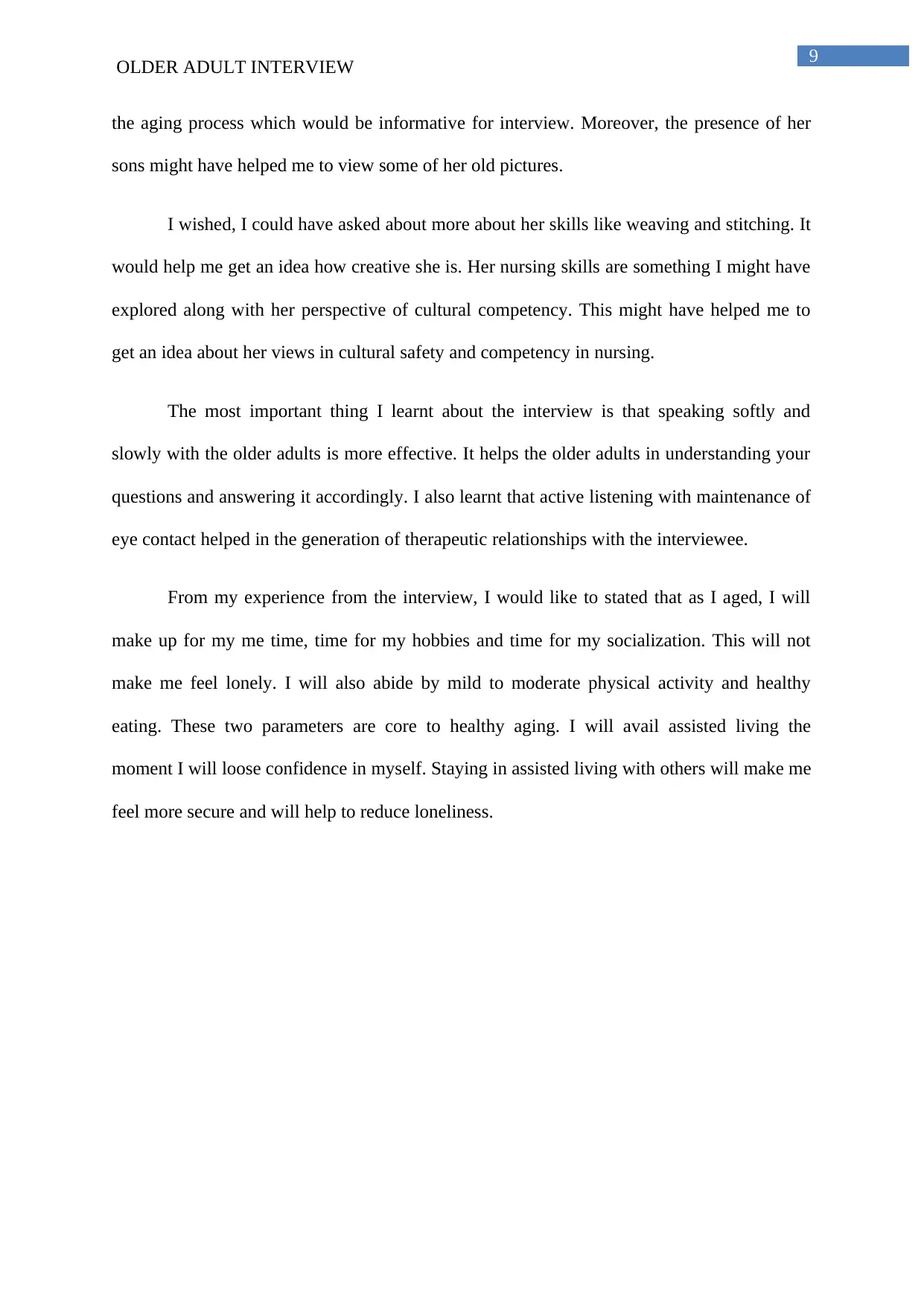
9
OLDER ADULT INTERVIEW
the aging process which would be informative for interview. Moreover, the presence of her
sons might have helped me to view some of her old pictures.
I wished, I could have asked about more about her skills like weaving and stitching. It
would help me get an idea how creative she is. Her nursing skills are something I might have
explored along with her perspective of cultural competency. This might have helped me to
get an idea about her views in cultural safety and competency in nursing.
The most important thing I learnt about the interview is that speaking softly and
slowly with the older adults is more effective. It helps the older adults in understanding your
questions and answering it accordingly. I also learnt that active listening with maintenance of
eye contact helped in the generation of therapeutic relationships with the interviewee.
From my experience from the interview, I would like to stated that as I aged, I will
make up for my me time, time for my hobbies and time for my socialization. This will not
make me feel lonely. I will also abide by mild to moderate physical activity and healthy
eating. These two parameters are core to healthy aging. I will avail assisted living the
moment I will loose confidence in myself. Staying in assisted living with others will make me
feel more secure and will help to reduce loneliness.
OLDER ADULT INTERVIEW
the aging process which would be informative for interview. Moreover, the presence of her
sons might have helped me to view some of her old pictures.
I wished, I could have asked about more about her skills like weaving and stitching. It
would help me get an idea how creative she is. Her nursing skills are something I might have
explored along with her perspective of cultural competency. This might have helped me to
get an idea about her views in cultural safety and competency in nursing.
The most important thing I learnt about the interview is that speaking softly and
slowly with the older adults is more effective. It helps the older adults in understanding your
questions and answering it accordingly. I also learnt that active listening with maintenance of
eye contact helped in the generation of therapeutic relationships with the interviewee.
From my experience from the interview, I would like to stated that as I aged, I will
make up for my me time, time for my hobbies and time for my socialization. This will not
make me feel lonely. I will also abide by mild to moderate physical activity and healthy
eating. These two parameters are core to healthy aging. I will avail assisted living the
moment I will loose confidence in myself. Staying in assisted living with others will make me
feel more secure and will help to reduce loneliness.
Paraphrase This Document
Need a fresh take? Get an instant paraphrase of this document with our AI Paraphraser
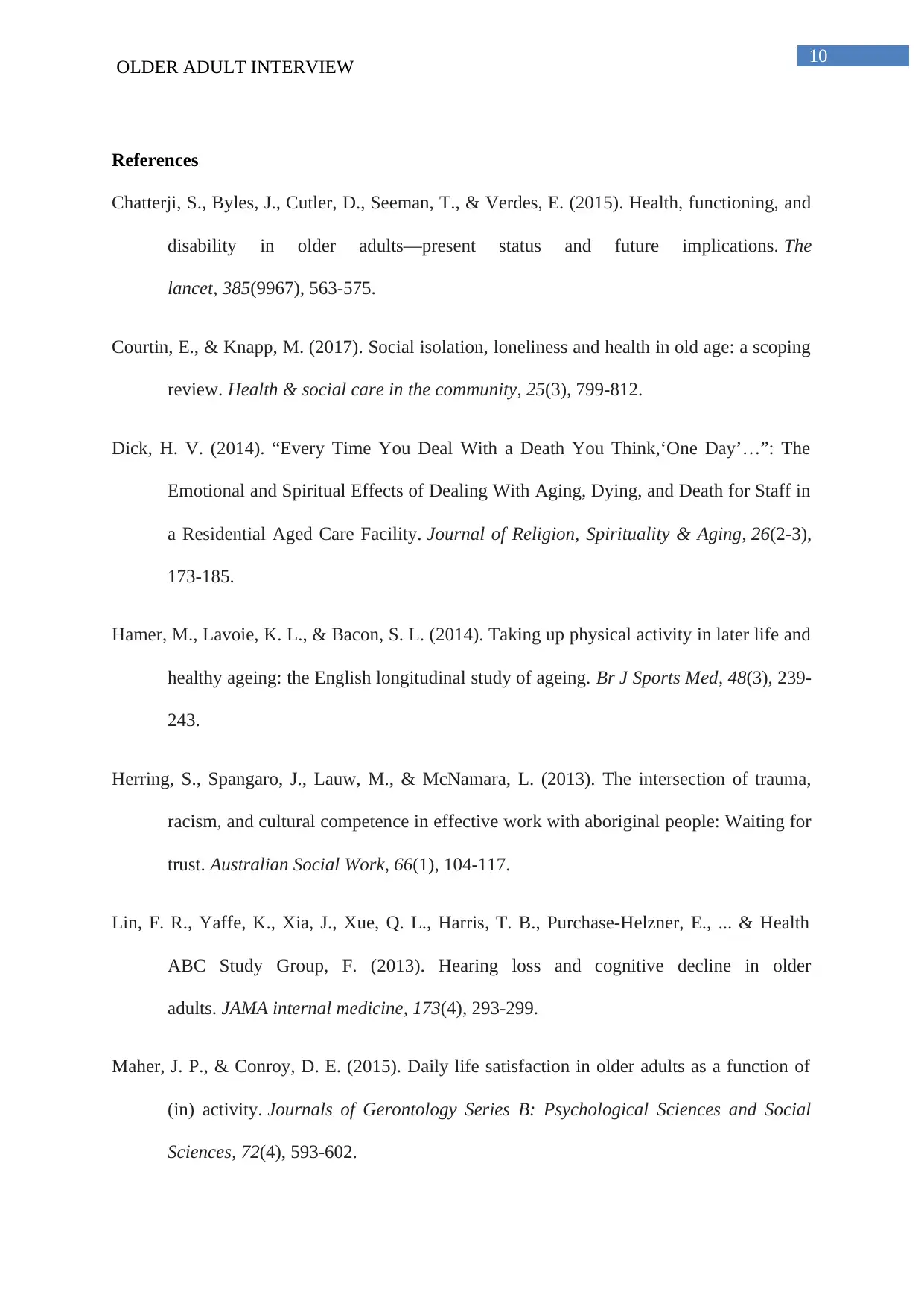
10
OLDER ADULT INTERVIEW
References
Chatterji, S., Byles, J., Cutler, D., Seeman, T., & Verdes, E. (2015). Health, functioning, and
disability in older adults—present status and future implications. The
lancet, 385(9967), 563-575.
Courtin, E., & Knapp, M. (2017). Social isolation, loneliness and health in old age: a scoping
review. Health & social care in the community, 25(3), 799-812.
Dick, H. V. (2014). “Every Time You Deal With a Death You Think,‘One Day’…”: The
Emotional and Spiritual Effects of Dealing With Aging, Dying, and Death for Staff in
a Residential Aged Care Facility. Journal of Religion, Spirituality & Aging, 26(2-3),
173-185.
Hamer, M., Lavoie, K. L., & Bacon, S. L. (2014). Taking up physical activity in later life and
healthy ageing: the English longitudinal study of ageing. Br J Sports Med, 48(3), 239-
243.
Herring, S., Spangaro, J., Lauw, M., & McNamara, L. (2013). The intersection of trauma,
racism, and cultural competence in effective work with aboriginal people: Waiting for
trust. Australian Social Work, 66(1), 104-117.
Lin, F. R., Yaffe, K., Xia, J., Xue, Q. L., Harris, T. B., Purchase-Helzner, E., ... & Health
ABC Study Group, F. (2013). Hearing loss and cognitive decline in older
adults. JAMA internal medicine, 173(4), 293-299.
Maher, J. P., & Conroy, D. E. (2015). Daily life satisfaction in older adults as a function of
(in) activity. Journals of Gerontology Series B: Psychological Sciences and Social
Sciences, 72(4), 593-602.
OLDER ADULT INTERVIEW
References
Chatterji, S., Byles, J., Cutler, D., Seeman, T., & Verdes, E. (2015). Health, functioning, and
disability in older adults—present status and future implications. The
lancet, 385(9967), 563-575.
Courtin, E., & Knapp, M. (2017). Social isolation, loneliness and health in old age: a scoping
review. Health & social care in the community, 25(3), 799-812.
Dick, H. V. (2014). “Every Time You Deal With a Death You Think,‘One Day’…”: The
Emotional and Spiritual Effects of Dealing With Aging, Dying, and Death for Staff in
a Residential Aged Care Facility. Journal of Religion, Spirituality & Aging, 26(2-3),
173-185.
Hamer, M., Lavoie, K. L., & Bacon, S. L. (2014). Taking up physical activity in later life and
healthy ageing: the English longitudinal study of ageing. Br J Sports Med, 48(3), 239-
243.
Herring, S., Spangaro, J., Lauw, M., & McNamara, L. (2013). The intersection of trauma,
racism, and cultural competence in effective work with aboriginal people: Waiting for
trust. Australian Social Work, 66(1), 104-117.
Lin, F. R., Yaffe, K., Xia, J., Xue, Q. L., Harris, T. B., Purchase-Helzner, E., ... & Health
ABC Study Group, F. (2013). Hearing loss and cognitive decline in older
adults. JAMA internal medicine, 173(4), 293-299.
Maher, J. P., & Conroy, D. E. (2015). Daily life satisfaction in older adults as a function of
(in) activity. Journals of Gerontology Series B: Psychological Sciences and Social
Sciences, 72(4), 593-602.
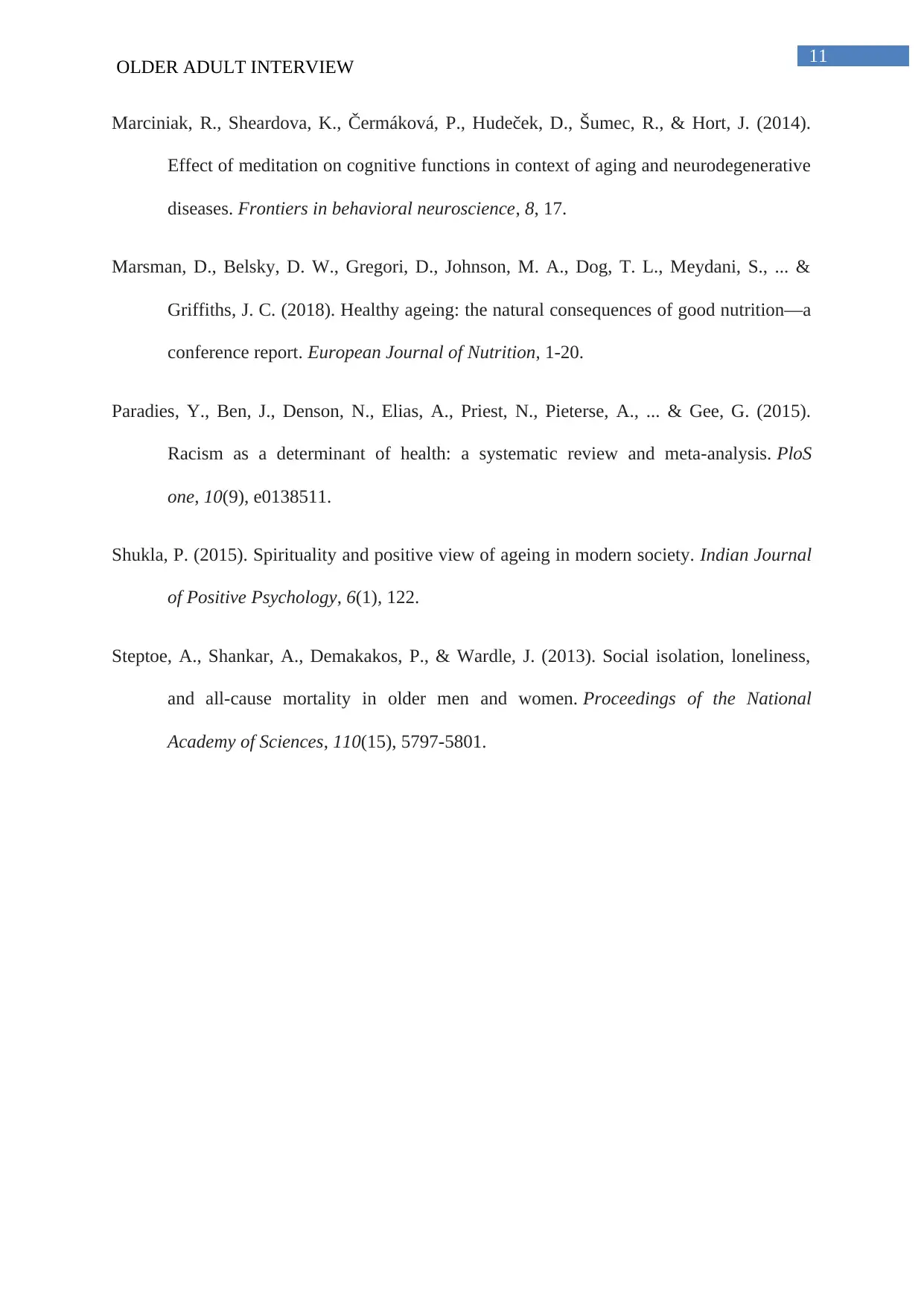
11
OLDER ADULT INTERVIEW
Marciniak, R., Sheardova, K., Čermáková, P., Hudeček, D., Šumec, R., & Hort, J. (2014).
Effect of meditation on cognitive functions in context of aging and neurodegenerative
diseases. Frontiers in behavioral neuroscience, 8, 17.
Marsman, D., Belsky, D. W., Gregori, D., Johnson, M. A., Dog, T. L., Meydani, S., ... &
Griffiths, J. C. (2018). Healthy ageing: the natural consequences of good nutrition—a
conference report. European Journal of Nutrition, 1-20.
Paradies, Y., Ben, J., Denson, N., Elias, A., Priest, N., Pieterse, A., ... & Gee, G. (2015).
Racism as a determinant of health: a systematic review and meta-analysis. PloS
one, 10(9), e0138511.
Shukla, P. (2015). Spirituality and positive view of ageing in modern society. Indian Journal
of Positive Psychology, 6(1), 122.
Steptoe, A., Shankar, A., Demakakos, P., & Wardle, J. (2013). Social isolation, loneliness,
and all-cause mortality in older men and women. Proceedings of the National
Academy of Sciences, 110(15), 5797-5801.
OLDER ADULT INTERVIEW
Marciniak, R., Sheardova, K., Čermáková, P., Hudeček, D., Šumec, R., & Hort, J. (2014).
Effect of meditation on cognitive functions in context of aging and neurodegenerative
diseases. Frontiers in behavioral neuroscience, 8, 17.
Marsman, D., Belsky, D. W., Gregori, D., Johnson, M. A., Dog, T. L., Meydani, S., ... &
Griffiths, J. C. (2018). Healthy ageing: the natural consequences of good nutrition—a
conference report. European Journal of Nutrition, 1-20.
Paradies, Y., Ben, J., Denson, N., Elias, A., Priest, N., Pieterse, A., ... & Gee, G. (2015).
Racism as a determinant of health: a systematic review and meta-analysis. PloS
one, 10(9), e0138511.
Shukla, P. (2015). Spirituality and positive view of ageing in modern society. Indian Journal
of Positive Psychology, 6(1), 122.
Steptoe, A., Shankar, A., Demakakos, P., & Wardle, J. (2013). Social isolation, loneliness,
and all-cause mortality in older men and women. Proceedings of the National
Academy of Sciences, 110(15), 5797-5801.
⊘ This is a preview!⊘
Do you want full access?
Subscribe today to unlock all pages.

Trusted by 1+ million students worldwide
1 out of 24
Related Documents
Your All-in-One AI-Powered Toolkit for Academic Success.
+13062052269
info@desklib.com
Available 24*7 on WhatsApp / Email
![[object Object]](/_next/static/media/star-bottom.7253800d.svg)
Unlock your academic potential
Copyright © 2020–2026 A2Z Services. All Rights Reserved. Developed and managed by ZUCOL.





